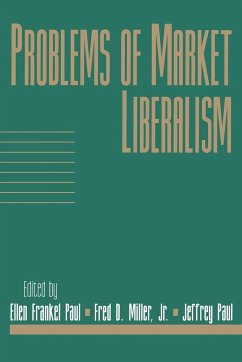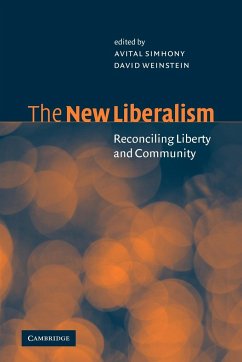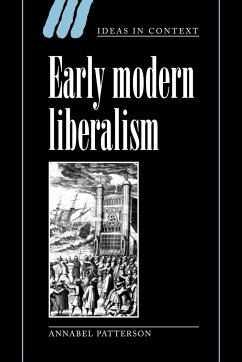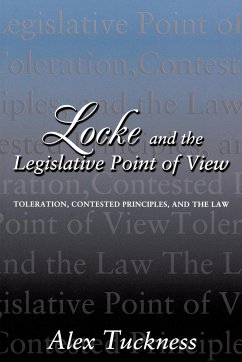
Natural Rights Liberalism from Locke to Nozick
Versandkostenfrei!
Versandfertig in 1-2 Wochen
49,99 €
inkl. MwSt.

PAYBACK Punkte
25 °P sammeln!
This collection of essays is dedicated to the memory of the Harvard philosopher Robert Nozick.This collection of essays is dedicated to the memory of the late Harvard philosopher Robert Nozick, who died in 2002. The publication of Nozick's Anarchy, State, and Utopia in 1974 revived serious interest in natural rights liberalism, which, beginning in the latter half of the eighteenth century, had been eclipsed by a succession of antithetical political theories including utilitarianism, progressivism, and various egalitarian and collectivist ideologies. Some of our contributors critique Nozick's p...
This collection of essays is dedicated to the memory of the Harvard philosopher Robert Nozick.
This collection of essays is dedicated to the memory of the late Harvard philosopher Robert Nozick, who died in 2002. The publication of Nozick's Anarchy, State, and Utopia in 1974 revived serious interest in natural rights liberalism, which, beginning in the latter half of the eighteenth century, had been eclipsed by a succession of antithetical political theories including utilitarianism, progressivism, and various egalitarian and collectivist ideologies. Some of our contributors critique Nozick's political philosophy. Other contributors examine earlier figures in the liberal tradition, most notably John Locke, whose Second Treatise of Government, published in the late seventeenth century, profoundly influenced the American founders. The remaining authors analyze natural rights liberalism's central doctrines.
Table of content:
1. The political needs of a toolmaking animal: Madison, Hamilton, Locke, and the question of property Paul A. Rahe; 2. Natural rights and imperial constitutionalism: the American Revolution and the development of the American amalgam Michael Zuckert; 3. There is no such thing as an unjust initial acquisition Edward Feser; 4. Nozick and Locke: filling the space of rights Jeremy Waldron; 5. Toward a theory of empirical natural rights John Hasnas; 6. History and pattern David Schmidtz; 7. Libertarianism at Twin Harvard Loren E. Lomasky; 8. Sidney Hook, Robert Nozick, and the paradoxes of freedom John Patrick Diggins; 9. Begging the question with style: Anarchy, State, and Utopia at thirty years Barbara H. Fried; 10. The shape of Lockean rights: fairness, pareto, moderation, and consent Richard J. Arneson; 11. One step beyond Nozick's minimal state: the role of forced exchanges in political theory Richard A. Epstein; 12. Natural rights and political legitimacy Christopher W. Morris; 13. Consent theory for libertarians A. John Simmons; 14. Prerogatives, restrictions, and rights Eric Mack.
This collection of essays is dedicated to the memory of the late Harvard philosopher Robert Nozick, who died in 2002. The publication of Nozick's Anarchy, State, and Utopia in 1974 revived serious interest in natural rights liberalism, which, beginning in the latter half of the eighteenth century, had been eclipsed by a succession of antithetical political theories including utilitarianism, progressivism, and various egalitarian and collectivist ideologies. Some of our contributors critique Nozick's political philosophy. Other contributors examine earlier figures in the liberal tradition, most notably John Locke, whose Second Treatise of Government, published in the late seventeenth century, profoundly influenced the American founders. The remaining authors analyze natural rights liberalism's central doctrines.
Table of content:
1. The political needs of a toolmaking animal: Madison, Hamilton, Locke, and the question of property Paul A. Rahe; 2. Natural rights and imperial constitutionalism: the American Revolution and the development of the American amalgam Michael Zuckert; 3. There is no such thing as an unjust initial acquisition Edward Feser; 4. Nozick and Locke: filling the space of rights Jeremy Waldron; 5. Toward a theory of empirical natural rights John Hasnas; 6. History and pattern David Schmidtz; 7. Libertarianism at Twin Harvard Loren E. Lomasky; 8. Sidney Hook, Robert Nozick, and the paradoxes of freedom John Patrick Diggins; 9. Begging the question with style: Anarchy, State, and Utopia at thirty years Barbara H. Fried; 10. The shape of Lockean rights: fairness, pareto, moderation, and consent Richard J. Arneson; 11. One step beyond Nozick's minimal state: the role of forced exchanges in political theory Richard A. Epstein; 12. Natural rights and political legitimacy Christopher W. Morris; 13. Consent theory for libertarians A. John Simmons; 14. Prerogatives, restrictions, and rights Eric Mack.














